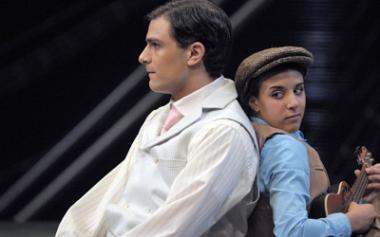If music be the food of love… vo-de-oh-doh!
In Shakespeare’s Twelfth Night, young Viola, shipwrecked on an alien shore, disguises herself as a boy and becomes the go-between for the local duke, Orsino, in his fruitless courtship of the local countess, Olivia—who promptly falls in love with Viola, thinking her a him.
In Dawn Monique Williams’ production at UMass, the land of Illyria is transported to 1920s America. Men in white flannel suits and flappers in dropped-waist dresses and cloche hats sip cocktails to music of the Jazz Age. The comic subplots involving all-night revels and an elaborate practical joke played on Olivia’s stuffy steward Malvolio take on the spirit of gin-soaked Prohibition-era pranks.
It was the music that initially drew Williams, an MFA candidate in the UMass Theater Department, to the Roaring ’20s—the music and the sexuality. “I wanted a jazz thing,” she says, including in that genre the meaty blues of Bessie Smith and Ma Rainey. The script is laced with song lyrics, many of them wistful, shadowing the sunny absurdities of the plot. “We wanted to go to that melancholy place and explore that,” Williams adds, by utilizing music of the period as well as original tunes by composer Luke Reed.
She also wanted to explore “the idea of androgyny in the play, and the transference of identity,” wherein a girl “becomes” a boy and sows romantic confusion, pursued by her employer’s beloved while falling in love with him. Williams found the 1920s ideal for engaging the question “What does gender mean to romantic love? Women were kind of boyish in their look,” she observes, and also, having just won the right to vote, “starting to take agency.”
In a startlingly original directorial twist, Williams ups the ante on Orsino’s growing fondness for Viola when, still thinking she’s a boy, he suddenly kisses her. “What’s important for me is that at the end,” when Olivia marries Viola’s twin brother, “Viola is not the consolation prize,” the director explains. “Orsino has found a person he has a true intimate connection to, and when she’s revealed as a woman he can socially act on that.”
Dramaturg Megan McClain points out that many of the characters in Twelfth Night “pursue misguided desires,” not all of which are sorted out in the denouement. The play’s melancholy undercurrent is reflected in the people who are left alone at the end.
Williams acknowledges that the production, as developed by her designers, has become “an abstraction of the ’20s. We got a little flexible with our period musically,” she says. And Miguel Romero’s setting is itself an abstraction. No Art Deco designs or Noel Coward-esque salons here, but a bare stage flanked by several freestanding panels painted with colorful foliage in the style of 18th-century landscape painter Antoine Watteau.
“In what appears to be a very lush environment, we can see the gaps,” McClain explains. “So we see that Illyria, which seems very glossy and lush, is actually sort of a sham, populated with people who put on an illusion of what they are.”
Twelfth Night: April 28-30, Rand Theater, Fine Arts Center, UMass, Amherst. 545-2511, (800) 999-UMAS or www.umass.edu/theater.



